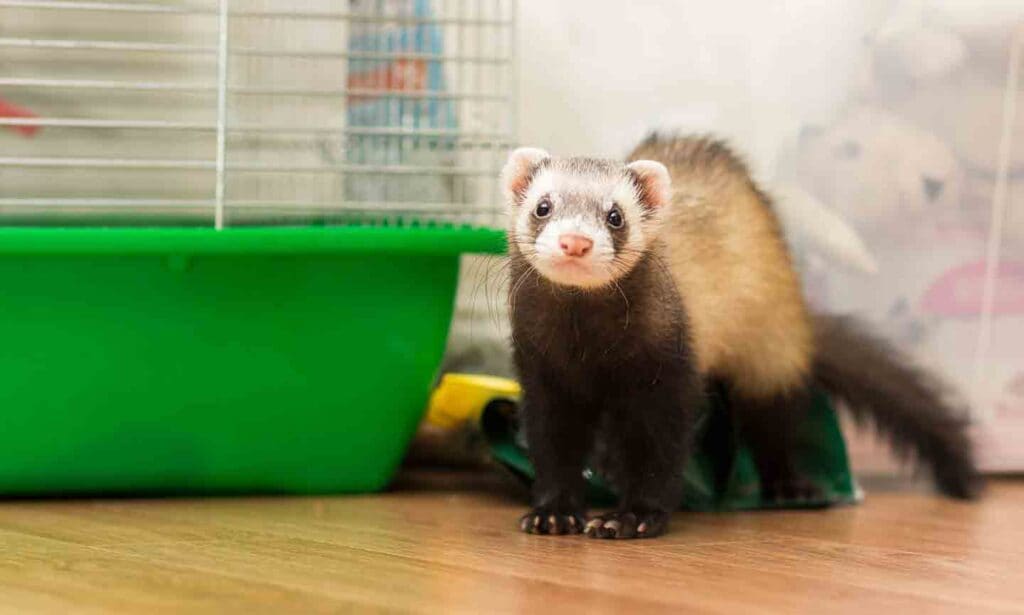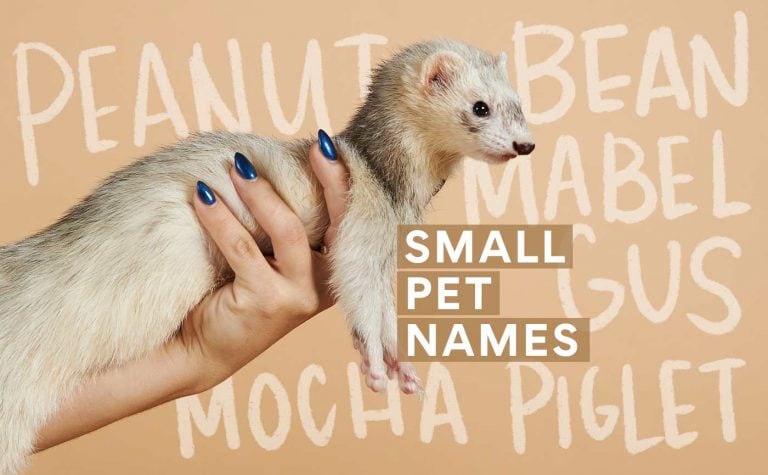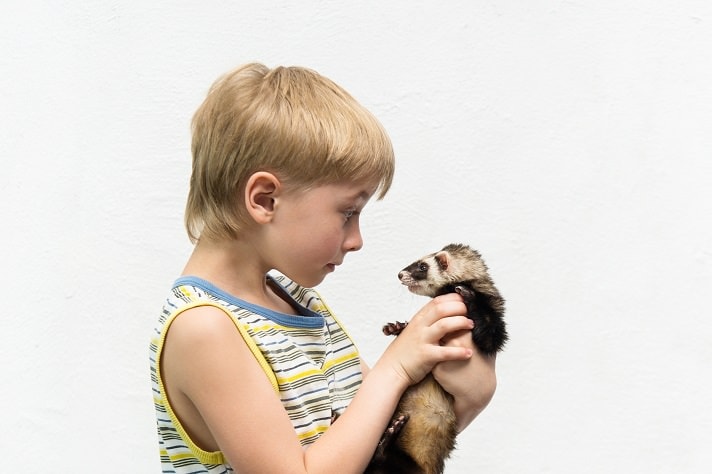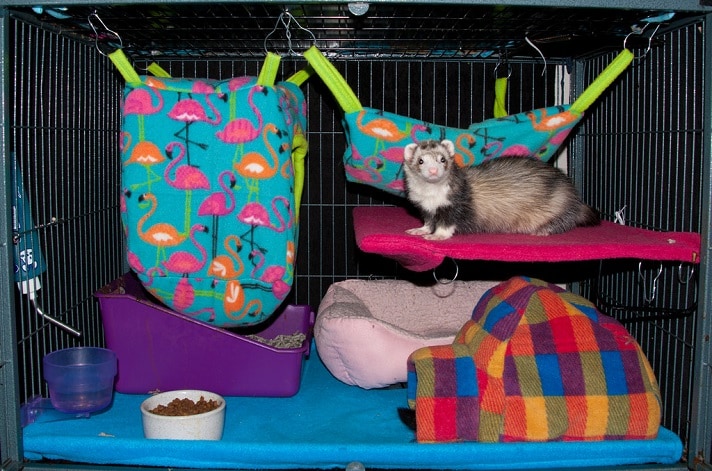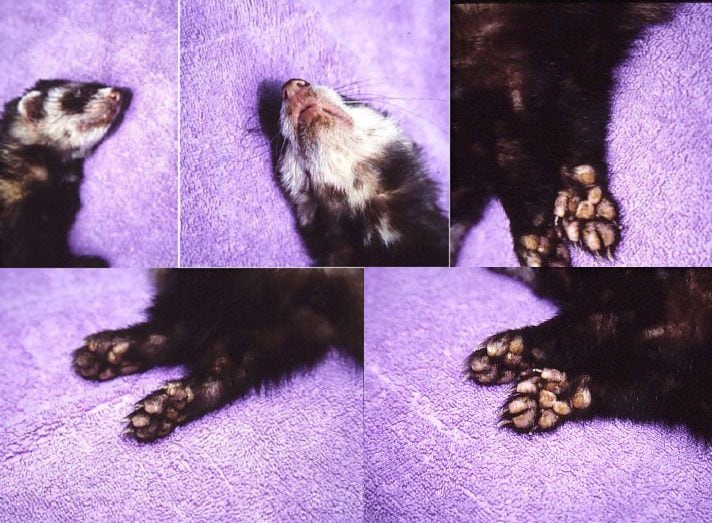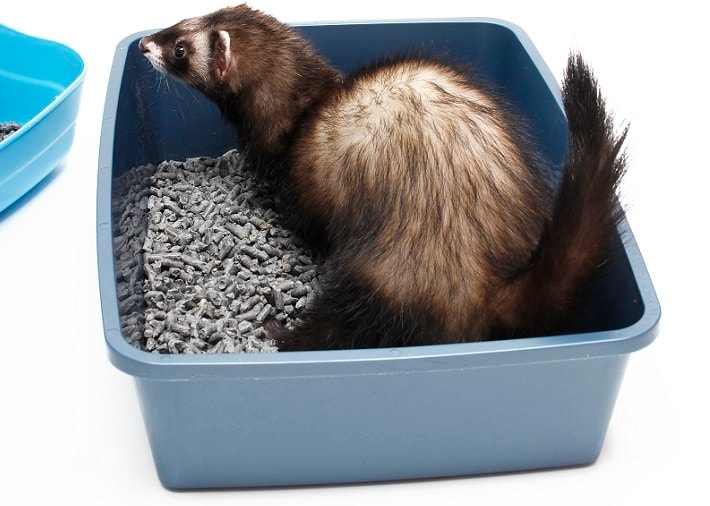Ferrets: An Overview
- Scientific name: Mustela putorius furo
- Size: The average size of male ferrets is 1.5 feet and 2.5-5 pounds. For female ferrets, the average size is 1.2 feet with a weight of 1-3 pounds.
- Life expectancy: Domesticated ferrets have an average lifespan of 4-10 years. Wild black-footed ferrets rarely live beyond 3 years of age.
Fun Facts About Ferrets
- The name ferret is derived from the Latin word furittus, which translates to “little thief.”
- Ferrets have a naturally musky odor from their anal glands and sebaceous glands in their skin.
- They were domesticated about 2,500 years ago and are descendants of the European polecat.
- A female ferret is referred to as a jill or sprite (if she’s spayed) while a male ferret is referred to as a hob or gib (if neutered). Baby ferrets are called kits.
- Ferrets aren’t legal to own in every state or city. (e.g., California, Hawaii and New York City ban them.) Many states and cities require annual licensing fees.
Ferret Supply Checklist
- Wire cage
- Flooring material
- Food and water dishes
- Litter box
- Litter
- Toys
- Soft bedding
- Ferret-proofing materials
- High-quality, protein-rich ferret food
- Water
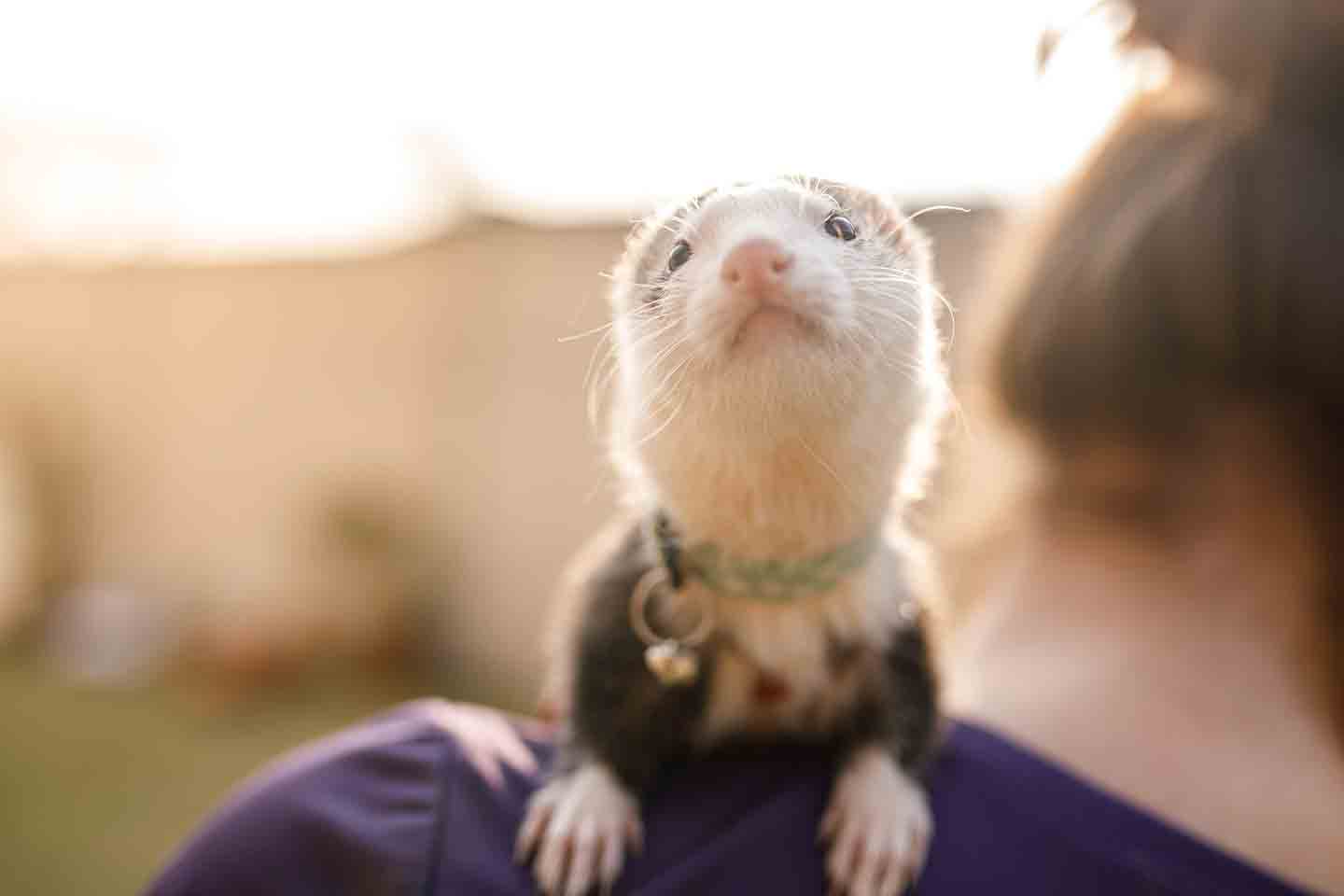
Habitat
Before bringing a ferret home, you’ll need to make sure you have everything on hand to build them a proper, safe habitat. Teresa Manucy, DVM, a veterinarian based in Jacksonville, Florida, and pet health representative for Chewy, says a ferret habitat has some unique traits. Let’s dive in.
Enclosure
Ferrets require a wire/metal, open-air enclosure that allows for good airflow. This gives them ample ability to breathe, and it also prevents them from living in an environment of trapped odors. For a single ferret, the cage should be at least 3 feet wide by 3 feet deep by 2 feet high. Depending on the size of your ferret, a larger cage can be used.
“There should be narrowed slats between the wires because they tend to squeeze between openings quite readily,” Dr. Manucy says. “The enclosure should also have a latch that they can’t pop open.” A great example is the Yaheetech Small Pet Cage.
Flooring/Bedding
While there are lots of options, Dr. Manucy says the best flooring (bedding) material for your pet ferret is a flexible, solid material that’s easy to clean. Linoleum or astroturf are her preferred options. She notes that shredded newspaper isn’t great since it can stain their little feet, and that wood chips are difficult to disinfect and tend to absorb odors.
Litter Box
Speaking of odors, ferrets can be litter box trained. Dr. Manucy recommends incorporating several boxes into their cage, as well as one in their designated play area outside of the cage.
“They have a very short digestive tract, so it only takes three to four hours for the food to be digested, and then they might have a very short holding time before they have to drop cargo,” Dr. Manucy says. “When they need to go, they need to go.”
Litter boxes should be filled with a pelleted litter (do not use cat litter) and scooped daily. Thoroughly clean and disinfect the litter box weekly to maintain cleanliness, and prevent the spread of bacteria and parasites. Be sure to keep litter boxes away from your ferret’s feeding and sleeping areas.
Food and Water Bowls
Simple ceramic or stainless steel bowls are great for your ferret’s water and food needs. Water bottles can also be used to ease access and cleaning. We’ll discuss specific ferret diets below.
Food bowls, water dishes and litter boxes all need to be secured so your ferret does not flip them over.
Accessories and Toys
Ferrets are curious and playful creatures, and toys are helpful for their mental and physical well-being, says Dr. Manucy.
Some good options include:
- Tunnels
- Hammocks
- Climbing structures
- Interactive toys
These provide opportunities for play, exploration and exercise, mimicking their natural behaviors. Check out the MidWest Nation Hanging Hideaway and Marshall Ferret-Go-Round.
Additionally, cozy bedding, hideaways and plush blankets create comfortable resting spots for ferrets to relax. Just make sure you're only using ferret-safe materials, and that you regularly inspect items for wear and tear to ensure your pet's safety.
Cleaning/Upkeep
You should clean your pet ferret’s enclosure daily to maintain a clean and healthy environment. This includes removing soiled bedding, waste and food debris, as well as wiping cage surfaces. You’ll both appreciate the fresher smell.
As mentioned above, the litter box should be scooped daily, and fully cleaned and replaced with fresh litter at least once a week. Regular cleaning helps prevent odor buildup, bacterial growth and ensures the well-being of your ferrets.
Ferret-Proofing Materials
Ferrets are notorious for getting into mischief, says Dr. Manucy. It’s imperative for keepers to ferret-proof their home, which includes getting cord protectors and baby gates, and securing potential escape routes. Furniture covers can also be helpful.
Dr. Manucy notes that ferrets require several supervised hours outside of their cage every day for their mental and physical health. It’s a good idea to create a ferret-proofed area where they can safely and happily roam.

Diet
Ferrets are obligate carnivores, meaning their bodies are made to digest meat-based materials. They aren’t able to process plant matter, carbohydrates and sugar (even fruits), so avoid giving them these items.
“There are commercial versions of ferret food, which are the most appropriate for them since it's hard to ensure the proper amounts, and the proper quality of the balance and nutrition,” Dr. Manucy says. Some great options include the Wysong Epigen 90 Ferret Food and Marshall Ferret Food. Cat food can come in handy in a pinch, but Dr. Manucy says it’s best to stick to a ferret diet.
How Often To Feed Your Ferret
Follow your vet’s guidance regarding how often to feed your ferret. Generally, you should offer your ferret small meals to help mimic their natural feeding habits. This typically means providing high-quality, protein-rich ferret food and ensuring their food bowl is always stocked.
Water Requirements
Fresh water should be available at all times to keep your ferret hydrated, says Dr. Manucy. She also recommends changing it daily so it remains fresh and enticing, and to limit bacterial growth.
Are Treats OK?
Dr. Manucy says she wouldn’t recommend giving your ferret treats. “Those tend to be more grain-based, and ferrets, because they're strict carnivores, don't do well with the non meat-based ingredients,” she says.
What Not To Feed Ferrets
Ferrets are carnivores with sensitive digestive systems, so it's crucial to avoid feeding them certain foods, including:
- Dairy
- Carbohydrates
- Sugars
- High-fat foods
- Plant-based items (like fruits and vegetables)
- Raw meat (to avoid exposure to Salmonella or Campylobacter)
Also make sure to avoid bones, since they can splinter and injure ferrets’ GI tracts.
Handling Your Ferret
Ferrets have long and slender bodies, which can put these small animals at risk of injury when being held, notes Dr. Manucy. It’s very important to remain gentle when picking up, holding or petting your ferret.
When holding them, scoop them up gently, making sure to support their chest with one hand and their hindquarters with the other. Avoid grabbing or squeezing them tightly, which can stress them out. When petting, stroke their back and sides gently, and avoid touching sensitive areas like their ears or tail unless necessary.
As always, keep an eye on their body language and respect their boundaries. You can build trust through positive interactions, which will help strengthen your bond, and ensure a positive experience for both you and your pet ferret.
Maintaining Your Ferret’s Health
As a pet parent, it’s important to provide ongoing ferret care to ensure your pet can lead a happy, fulfilling and healthy life.
Signs of a Healthy Pet Ferret
Here are some of the key signs your pet ferret is healthy, according to Dr. Manucy.
- Shiny, full coat
- A healthy weight (not too thin or obese)
- Consistent, solid stool
- Urinating normally and regularly
- Have a sense of playfulness and good energy
Common Health Problems
These little guys are susceptible to certain diseases and illnesses like other pets. Common health issues in ferrets include the following:
- Hairballs
- Dental disease
- Heart disease
- Adrenal disease
- Insulinoma
- GI tract problems, including blockages caused by ingesting foreign objects
- Respiratory infections
- Parasites, such as fleas, ticks and ear mites
- Skin conditions like dermatitis and hair loss due to poor diet or allergies
When To See Your Vet
Arrange a visit with your vet as soon as you adopt your pet ferret or purchase from a breeder. At their initial checkup, your vet will inspect your ferret for signs of illness so you can treat any issues right away. They’ll also recommend certain vaccinations, including a rabies vaccine and canine distemper vaccine, since ferrets are highly susceptible to these.
Like other animals, your pet ferret requires an annual vet visit. During these appointments, your vet will perform a thorough physical exam and may take blood samples to get a better idea of their current health. Early detection and prompt treatment are crucial for maintaining the health and well-being of pet ferrets.
How To Find a Ferret Vet
The American Ferret Association maintains a worldwide database of ferret veterinarians. You can also find recommendations by joining ferret owner groups and forums, where you can get word-of-mouth recommendations for trustworthy ferret vets. Some veterinarian offices that usually care for cats and dogs may be able to provide some resources as well.
FAQs About Pet Ferrets
Q:
Do ferrets make good pets?
Q:
Are ferrets high-maintenance?
Q:
What is the cost of a pet ferret?
Q:
What is de-scenting in ferrets?
From albino and sable varieties to teeny, young ferrets and mature cuties, it’s important to tend to your ferret’s health and well-being from the get-go. Make sure you have all the necessities before bringing a pet ferret into your home, and follow the above advice regarding medical care and lifestyle so they can live a long, happy and healthy life with you.
Expert input provided by Teresa Manucy, DVM, a veterinarian based in Jacksonville, Florida, and pet health representative for Chewy; and Dwight Alleyne, DVM, a veterinarian at Acres Mill Veterinary Clinic in Canton, Georgia.
This content was medically reviewed by Chewy vets.
Share:
